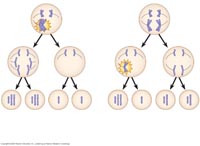
a completely firm grasp of meiosis (particularly prophase I and metaphase I) and independent assortment.
1. Why does the magnitude of the mutation typically corelate with its likelyhood of a deleterious (bad) effect?
2. What is polyploidy?
3. If polyploidy occurs by the failure of meiosis, why is a triploid offspring most likely?
4. Why are triploid species rare?
5. Monoecious organisms (hermaphrodites like many plants) can produce tetraploid offspring more easily that dioecious species. Why?
6. Why are tetraploids more likely to persist as a populationthan triploids?
7. Why are tetraploid offspring reproductively isolated from (and therefore different species from) their parents?
8. How does an aneuploidy like Down's trisomy 21 occur?
9. How can a gen be duplicated?
10. Why can gene duplication be a bad thing?
11. How can gene duplication be a good thing? Describe two reasons.
12. What is an inversion? How does it occur? What effect does it have on the inheritance of genes in the inversion region? What effect does this have on how these genes are selected?
END OF MATERIAL FOR EXAM 2
13. Explain the different effects that a base substitution can have on the effect of the resulting protein.
14. Why do additions or deletions of a base almost always result in the loss of protein function?